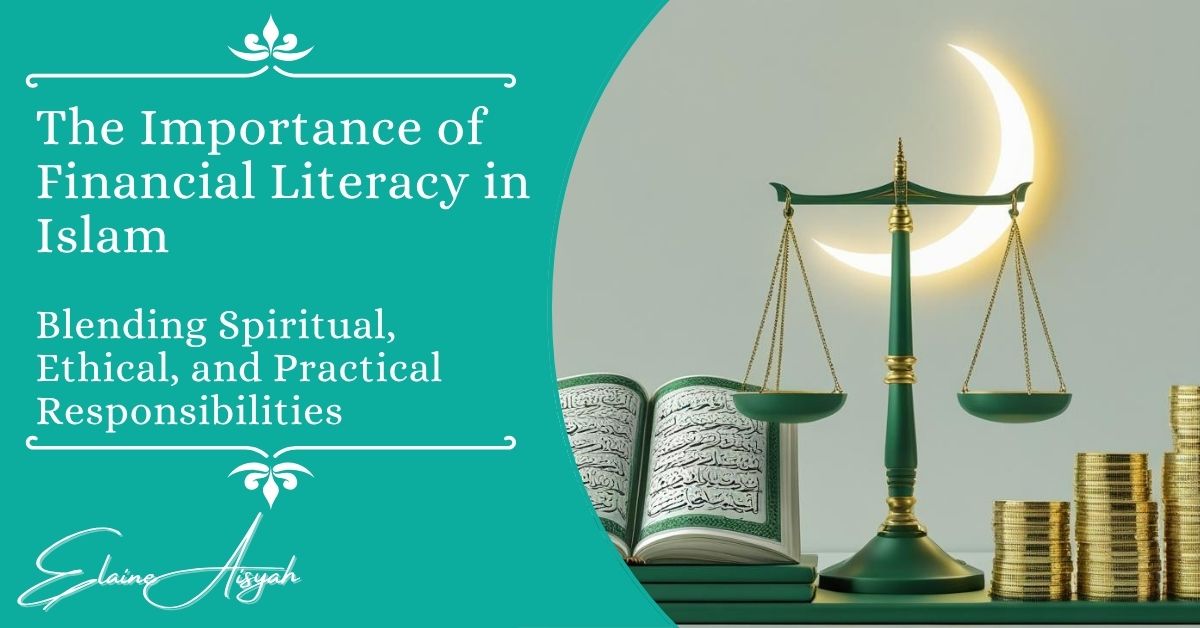The Importance of Financial Literacy in Islam cannot be overstated, as it plays a vital role in guiding Muslims toward ethical financial decisions and a balanced, purposeful life.
Rooted in principles of fairness, accountability, and social justice, Islam places a strong emphasis on managing wealth responsibly. It is not only for personal gain but also for the betterment of the wider community.
In today’s increasingly complex financial landscape, I find that understanding Islamic teachings on money management, debt, savings, and charitable giving is more important than ever.
Islamic finance isn’t a modern invention, but a centuries-old practice grounded in Shariah law.
You can think of it as the guidebook for Muslims on conducting economic activities fairly and ethically. While the core principles remain, the way we apply them has evolved, blending tradition with today’s tech-driven world.
Why does this matter now more than ever? If you have noticed, global financial systems are getting more and more complex, and I believe Muslims worldwide need to navigate this maze without straying from their religious values.
It’s a bit like keeping your GPS active on a road trip, ensuring you don’t take a wrong turn just because the route seems quicker. I truly believe this is very important.
Getting the hang of financial literacy in the Islamic context can feel daunting at first, but it’s about learning to make informed choices that keep you aligned with your faith. Understanding this balance empowers Muslims to thrive economically without compromising their core beliefs.
This blog explores why financial literacy in Islam is not just a modern skill, but a timeless value deeply embedded in Islamic tradition.
Principles of Financial Literacy in Islam
Islamic finance is built on a few key principles that make it unique and fascinating. Let us examine these principles.
First, there’s the prohibition of riba, or interest. This ban is like the cornerstone of Islamic finance, meant to ensure that money is used fairly and doesn’t exploit anyone.
When lending money, the focus is on risk-sharing instead of just interest-based earnings, promoting justice and equity in transactions.
Another vital aspect is avoiding gharar, which means steering clear of excessive uncertainty.
In practical terms, this translates to avoiding risky investments where the outcome isn’t clear. It’s like having a safety net to make sure decisions are based on clear and honest intentions rather than blind leaps into the unknown.

There’s also a focus on avoiding haram, or prohibited activities. This means investments should be geared towards goods or services allowed in Islam. This consideration ensures that financial dealings do not harm society, underpinning ethical conduct in every transaction.
Zakat, a form of mandatory charity, plays a huge role in economic justice and wealth distribution among Muslims. It’s a concept that is not only about giving away money but is also about purifying wealth and supporting community welfare. This principle teaches that financial literacy isn’t solely for personal gain but for societal benefit too.
Together, these elements shape a responsible financial lifestyle. It supports the fostering of a mindset that blends ethical guidance with practical economic decisions.
With these principles as a compass, Muslims can navigate both their personal and professional worlds effectively.
Benefits of Financial Literacy for Muslims
Being financially savvy empowers and provide us with a peace of mind. For Muslims, understanding finance is about making choices that reflect faith and integrity.
It leads to greater confidence in navigating daily financial decisions, whether that’s budgeting for a household or planning long-term investments.
By harnessing financial literacy, Muslims can engage in ethical investments that align with Islamic values. This involves supporting industries and services that contribute positively to the community and steering clear of those that don’t.
Such conscious decision-making promotes sustainability and social responsibility, reflecting the holistic nature of financial literacy in Islam.
Informed financial practices also contribute significantly to alleviating poverty within the Muslim community.
The more educated we are on financial literacy, the better we can use resources and skills to tackle financial challenges, leading to stronger community bonds and long-term development. It transforms financial struggles into opportunities for growth and prosperity, potentially lifting everyone.

Moreover, financial literacy provides a solid foundation for good financial habits, fostering a culture of saving, investing, and sharing wealth fairly.
If we can pick up such habits as early in our lives as possible, it can also have a ripple effect to influence our families and communities to do the same, creating an environment where everyone thrives.
Thus, understanding these benefits highlights how essential financial literacy is in achieving both personal fulfillment and collective well-being.
Application of Financial Literacy in Everyday Muslim Life
Translating the principles of Islamic finance into daily life may seem challenging, but it starts with small, consistent actions rooted in awareness and intention.
Our everyday choices like budgeting mindfully, avoiding interest-bearing credit cards, and saving for future needs all reflect the essence of financial literacy in Islam.
It’s about using wealth as a means of stewardship, not just accumulation.
When making purchases, a financially literate Muslim will think beyond price tags, considering whether the item or service is halal, how it affects their long-term financial health, and whether it aligns with Islamic ethics.
For instance, choosing Islamic banking products such as Shariah-compliant savings accounts or takaful (Islamic insurance) ensures that daily financial dealings are in line with faith.
Families can also apply financial literacy by instilling values of saving and charity in children from a young age.

When we teach our kids about zakat, budgeting their allowance, or saving for Eid, it helps create a foundation of responsible money habits that grow with them.
For business owners and professionals, financial literacy helps ensure fair employment practices, ethical pricing, and transparency in dealings.
Whether it’s negotiating contracts, managing investments, or planning retirement, the aim is to remain mindful of the Islamic values of fairness, honesty, and community care.
Ultimately, it’s not about perfection, but about striving to make better, more informed choices that honour both personal goals and religious principles.
The Role of Estate Planning in Islamic Financial Literacy
An essential yet often neglected part of financial literacy in Islam that I also want to highlight is estate planning—the preparation of how one’s wealth will be managed and distributed after death, in accordance with Shariah.
Far from being a concern only for the wealthy, estate planning is a religious duty that reflects foresight, responsibility, and care for one’s loved ones and community.
In Islam, inheritance laws (faraid) are clearly outlined in the Quran to ensure a just and fair distribution of wealth. Understanding these rules is part of being financially literate.
However, many Muslims today are unaware of how these laws apply or neglect to document their wishes properly, which can lead to family disputes or delays in estate distribution.
Consequently, approximately RM 65 billion worth of assets in Malaysia are frozen as of February 2025.
Proper estate planning includes preparing a wasiat (Islamic will), appointing guardians for dependents, settling debts, and planning for the payment of zakat or sadaqah from the estate.
It ensures that assets are distributed correctly and that the individual fulfils their duties to both family and society, even after death.
In a modern context, this might involve working with estate planners familiar with Islamic law, making sure financial instruments (like insurance or investments) are Shariah-compliant, and keeping clear records.

It also provides peace of mind, knowing that loved ones are protected and that one’s legacy is handled with dignity and faith.
Therefore, estate planning is not just a financial task, but an act of worship and preparation for the Hereafter, a final opportunity to reflect Islamic values through thoughtful action.
Key Takeaway
Financial literacy in Islam is more than just a modern skill. It is a comprehensive way of life that blends spiritual, ethical, and practical responsibilities.
It empowers Muslims to manage their wealth in a way that reflects trust in Allah, care for the community, and accountability for every financial decision made.
From everyday budgeting and ethical investing to paying zakat and avoiding riba, financial literacy helps Muslims navigate complex financial systems without compromising their faith.
Importantly, it also extends to estate planning, ensuring that one’s wealth is distributed justly, debts are cleared, and loved ones are provided for in accordance with Shariah. This foresight is not just a financial matter, but a spiritual one, demonstrating responsibility even beyond this life.
As financial landscapes continue to evolve, staying informed and intentional allows Muslims to thrive economically while honouring their religious principles.
Embracing financial literacy supports us to live with purpose, preparing for the future, and leaving behind a legacy rooted in faith and fairness.
If you ever need help on working out a holistic financial plan, let me know. I’m here for you.
